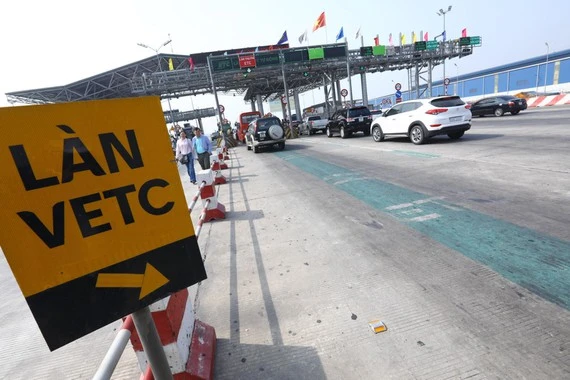
MOT asked to share risks
After five years of implementation, VETC has filed a request to withdraw from the ETC projects because many BOT investors (build-operate-transfer) have refused to cooperate, causing businesses to face risk of bankruptcy. Therefore, VETC has recommended to the Ministry of Transport to either choose other investors to transfer the projects to or return the projects back to the State, so as to ensure its continued implementation. To resolve the issues, the Ministry of Transport has written to the Prime Minister requesting further advice or termination of contracts. If required to continue implementation, VETC has recommended that the Ministry of Transport share the risks and also compensate for losses in revenue.
The public is also questioning why it is so hard to implement such a good functioning policy, and if the delay in the electronic toll collection projects stems from the economic interests of BOT investors or some other vested groups.
According to experts, in the planning of such projects, businesses do not fully assess the level of risks during the implementation process, since the electronic toll collection project is not only for buying equipment, building software, bringing installations and collecting money at BOT stations. Between VETC and the BOT investor they must sign an appendix of the contract for the costs incurred by the electronic toll collection system installation. This is a financial procedure that must be respected and implemented, so why have only eleven out of 44 toll stations signed the service contract, while 33 stations have not yet signed, and the two parties have not reached an agreement yet, which has caused delays in the project.
Lack of coordination
The electronic toll collection method has been tried and tested in many countries and has been very successful everywhere. It ensures public participation, transparency, and saves user time. However, to implement the project there are needs to be close cooperation with related parties, such as equipment deployment units, BOT operators, banks and other related authorities.
The Vietnam Electronic Toll Collection Company has now recommended to the Ministry of Transport that returning the electronic toll collection projects back to the State is a better solution to resolve the conflict in opinion between them and the BOT investors. Both sides clearly have not reached an agreement as to the implementation of the project and how to operate this service. For example, in the appendix for contract between VETC and the BOT investors, the fee deduction is a controversial provision between the two parties. The fee deduction level needs specific clarity and agreement between the two parties, but so far the parties have not been able to come to any agreement. This is also the reason why many BOT investors do not want VETC to install the equipments.
Until now, only 10% of BOT stations have been handed over to tolling stations with the same percentage of swipe ETC card machines, which is too modest a number as there is not much time left to do to finish the projects.
The BOT investors pay VETC 3%, 5% or 7% fee as per a decision of the Ministry of Transport. This fee is not set by VETC but is approved by the Ministry of Transport after consultation with the Ministry of Finance. But it seems that the Ministry of Transport has “forgotten" this issue.
The electronic toll collection project has not stopped for five years, but the progress is too slow and so far there is risk of collapse. In this case, not only VETC and BOT investors, but state management agencies such as Vietnam Road Administration and the Ministry of Transport need to review the implementation of this project, as well as the responsibilities of all the parties concerned.




















